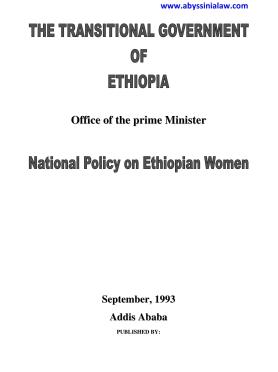National policy on Ethiopian women
National policy on Ethiopian women
Ethiopia women are actively involved in all aspects of their society`s life. The fact that women are both producers and procreators, as well as active participants in the social, political and cultural activities of their communities has enabled them to play an all round role. The discriminatory political, economic and social rules and regulations prevailing in the country (which constitute discrimination against women) have barred women from enjoying the fruits of their labor. Thus, deprived of equal opportunities, they are made to lag behind men in all fields of self advancement.
Women constitute proportionally a large group of the labor force in various economic sectors. Therefore economic development is unthinkable without the participation of women. However, to date, Ethiopian women have not been able to equally benefit for the nation’s wealth, because their labor and their participation in the economy have not been duly valued.
Though women’s share of the division of labor differs from place to place and from culture to culture, their average working day is believed to vary between 13 and 17 hours per day. Actually, women involved in farming activities tend to even work longer hours. Urban women engaged in labor-intensive activities that require little or no skill spend no less time.
As child bearers, women have direct contact with the younger generation of the labor force. They can, therefore, influence their children both positively and negatively, especially during (the periods of the latter’s) infancy and childhood period. In this vein, the key role they play as mothers makes their advice more heeded than that of men.

